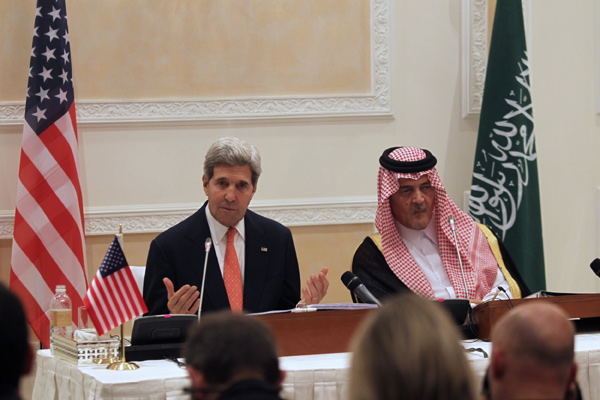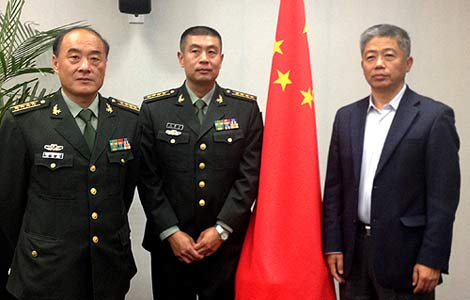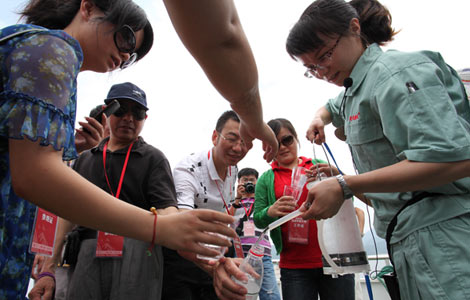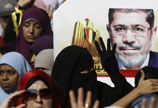Kerry denies tensions between US, Saudi Arabia
Updated: 2013-11-05 09:39
(Xinhua)
|
||||||||
 |
|
US Secretary of State John Kerry (L) and Saudi Foreign Minister Prince Saud al-Faisal attend a joint news conference in Riyadh Nov 4, 2013. [Photo/Agencies] |
RIYADH - US Secretary of State John Kerry denied on Monday reports of tensions between the United States and Saudi Arabia amid current crises in the region, such as the Syrian conflict and US nuclear negotiations with Iran.
Describing the relations between the two countries as "strategic and historical", Kerry said, in a joint press conference with Saudi Foreign Minister Prince Saud al-Faisal in Riyadh, that relations would "not be affected by tactical positions or transient crises".
The US official reassured Saudi officials that the recent American-Iranian talks aim to find a solution to the nuclear issue in a diplomatic way, while reaffirming his country's commitment to cooperate with regional allies.
He informed Saudi officials of the progress in the talks with Iran, emphasizing that such talks would not come at the expense of established relations in the region. He added the United States desires to retain alliances and protect its allies by assuring the flow of oil and the continuation of counter-terrorism to make the Middle East region free from "weapons of mass destruction."
Concerning the Geneva II conference, which is meant to find a solution to the Syrian crisis, Kerry highlighted the efforts to hold the talks in consultation with all concerned parties, stressing that Syrian President Bashar al-Assad should step aside to allow the formation of a transitional government in Syria. He urged that the conference be held quickly with all parties together to avert the outbreak of more violence.
The Saudi foreign minister, for his part, emphasized that relations between his country and the United States was based on sovereignty, mutual respect and cooperation which served the security interests of both countries. He explained that Saudi Arabia's recent refusal to the rotating seat in the United Nations' Security Council came as the result of the Council's failure to address key issues in the region, especially the Israeli- Palestinian issue and the Syrian crisis as well as its inability to make the Middle East region free from weapons of mass destruction.
He emphasized the importance of pursuing negotiations to solve these issues according to a specific timetable, noting that the reality of the Syrian crisis is exacerbated by the slow pace of the international community in addressing the ongoing humanitarian crisis in the country.
Faisal said there is "no role" for al-Assad in Syria's transitional phase, stressing the importance of the participation of opposition groups in the upcoming conference. He added that Saudi Arabia is committed to peace and a dialogue that represents the Syrian people.
Kerry's trip to Saudi Arabia is part of his nine-day trip to the Middle East and Europe. Kerry began his trip on Sunday in Egypt, where he met with Egyptian foreign minister and officials in the transitional government.

 New York City Marathon
New York City Marathon
 Not talking trash
Not talking trash
 Training begins for weapons destruction
Training begins for weapons destruction
 Police detain swimming star for driving SUV without license
Police detain swimming star for driving SUV without license
 Nongfu Spring accuses Beijing Times of defamation
Nongfu Spring accuses Beijing Times of defamation
 Movie director Feng leaves a lasting impression in Hollywood
Movie director Feng leaves a lasting impression in Hollywood
 Egypt's Morsi arrives at court for trial
Egypt's Morsi arrives at court for trial
 Rare solar eclipse 2013
Rare solar eclipse 2013
Most Viewed
Editor's Picks

|

|

|

|

|

|
Today's Top News
Merkel says US ties must not be put at risk
New warning on overcapacity
White House dismisses Snowden's clemency plea
Wall Street Journal wades into dispute
Xi calls for targeted policies to fight poverty
Separatists spreading skills over Net
Strong IPO lineup on US bourses
New ideas urged on Taiwan issue
US Weekly

|

|






